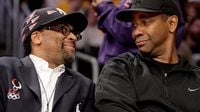After a five-year hiatus, director Spike Lee returns to the big screen with a bold new vision in Highest 2 Lowest, a film that reunites him with longtime collaborator Denzel Washington. Released in theaters on August 15, 2025, the movie is a daring reimagining of Akira Kurosawa’s 1963 classic High and Low, this time transplanted from postwar Tokyo to the bustling, ever-changing streets of New York City.
At the heart of Highest 2 Lowest is David King, played by Washington, a renowned music executive whose knack for discovering chart-topping talent has earned him the moniker “the best ears in the business,” according to the film’s script. King’s life is one of opulence: his high-rise apartment boasts sweeping views of Manhattan and the Brooklyn Bridge, its walls adorned with Basquiat paintings, gold records, and magazine covers featuring his own image. His wife, Pam (Ilfenesh Hadira), and son, Trey (Aubrey Joseph), live in similar luxury, their mornings punctuated by idle discussions of half-million-dollar charitable donations and chauffeured rides to basketball camp in a Rolls Royce.
But beneath the glittering surface, trouble brews. King’s record label faces a looming corporate takeover, and he’s scrambling to raise the capital needed to buy out a partner and maintain control. The stakes are high—his legacy and the future of his company hang in the balance. Then, disaster strikes: outside a basketball practice at LIU, King’s son Trey is seemingly kidnapped in a brazen act that brings the NYPD’s special investigations unit swarming to the family’s door, phones wiretapped and nerves frayed.
Yet, in a twist that upends the family’s world, it’s revealed that the victim isn’t Trey at all, but Kyle (Elijah Wright), the son of King’s longtime friend and chauffeur, Paul Christopher (Jeffrey Wright). The kidnapper, a struggling rapper named Yung Felon (A$AP Rocky), had intended to snatch King’s son, hoping for a hefty ransom. Instead, he finds himself holding the wrong child, but his demands remain unchanged.
This mistake plunges King into a profound moral quandary. Should he pay the ransom, risking the very funds he needs to save his company, or should he hold out—potentially sacrificing Kyle’s safety for the greater good of his business and family? The tension is palpable, as King is pulled in every direction by the police, Paul’s desperate pleas, and his own conscience. As Houston CultureMap reports, "King is forced to wrestle with his conscience over whether to use ransom money for Kyle, money that was supposed to rescue Trey before the mistake is discovered."
The film’s narrative, adapted by first-time screenwriter Alan Fox, draws heavily from Kurosawa’s original, but with a distinctly American twist. The industry has changed—Mifune’s character was a shoe manufacturer; Washington’s is a creator of music icons. The shift in setting and profession brings new layers to the story, exploring not only the corrosive influence of wealth and the complexities of classism, but also the challenges of Black artistic integrity and the struggle to remain relevant in a rapidly evolving cultural landscape.
According to Houston CultureMap, "Lee, working from a script by first-time screenwriter Alan Fox, once again showcases New York City for all it’s worth." The city is more than a backdrop; it’s a character in its own right. From King’s lavish apartment to the streets of the Bronx, Lee’s camera captures the energy and diversity of the metropolis. A standout sequence unfolds during the National Puerto Rican Day Parade, where a high-octane chase is set to a live performance by Eddie Palmeieri and his band. Denzel’s character is caught in the chaos, trying to make a ransom drop while dodging subway cars packed with rowdy Yankees fans chanting, “Fuck Boston,” all as the NYPD closes in on the scooter-riding kidnappers.
Despite these flashes of Lee’s trademark style, critical reception has been mixed. While some reviewers have praised the ambition and thematic depth of the film, others have found fault with its execution. As Houston CultureMap notes, "Lee and Fox deliver some clunky storytelling, with the flow from scene to scene rarely feeling natural. The drama of certain situations never reaches its potential because Lee seems to be focused on things like showing small moments from different angles instead of getting to the heart of the matter." The review goes on to lament that "the most obvious topic would seem to be the current state of the music business and the place of Black artists within it, but the kidnapping plot mostly pushes that to the side."
Acting, too, has drawn criticism. Both Washington and Wright, typically celebrated for their gravitas, are said to deliver performances that fall short of expectations. "Washington and Wright are each Oscar nominees who usually garner respect just with their presence, but both give subpar performances that are indicative of the poor acting from many other cast members. Stilted line deliveries abound throughout the film, almost as if Lee was limited to just one take with every scene and just decided to leave them as is," writes Houston CultureMap.
Yet, not all is lost. For some, Highest 2 Lowest is a testament to Lee’s enduring relevance and willingness to grapple with big questions—about art, power, responsibility, and the shifting sands of culture. The film’s central dilemma—whether to risk everything for a friend or protect one’s own legacy—mirrors Lee’s own journey as a filmmaker navigating a changing industry. As one reviewer puts it, "Lee resolves this dilemma in a way that reflects his career path, opting to forego the kind of soul-sucking horseshit that his contemporaries put up with to get their projects to the screen. It’s meant to feel somewhat unsatisfying even as it’s genuinely affirming—these are questions that no one has the answer to, not even Kurosawa. You just keep on going, try to do the right thing, and try not to let your work ground you down to the point that you lose enthusiasm for what you do."
Performances by A$AP Rocky and Jeffrey Wright offer some of the film’s most memorable moments, from a pseudo rap-battle with Denzel to a scene-stealing one-liner involving a ratchet in the Rolls’ console. These flashes of brilliance, coupled with Lee’s vibrant portrait of New York, ensure that Highest 2 Lowest remains entertaining and thought-provoking, even if it doesn’t quite reach the heights of the director’s best work.
Ultimately, Highest 2 Lowest is a film about choices—about what we’re willing to risk for those we care about, and what it means to hold on to integrity in a world that’s constantly changing. It may not be perfect, but it’s unmistakably Spike Lee: ambitious, messy, and full of heart.



